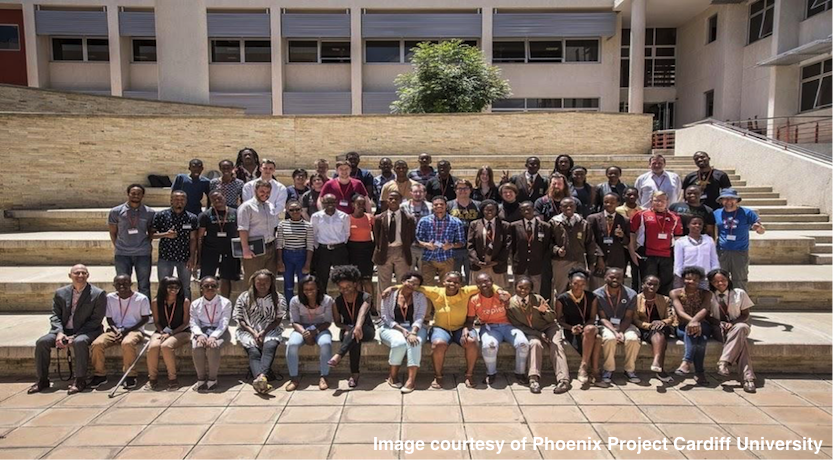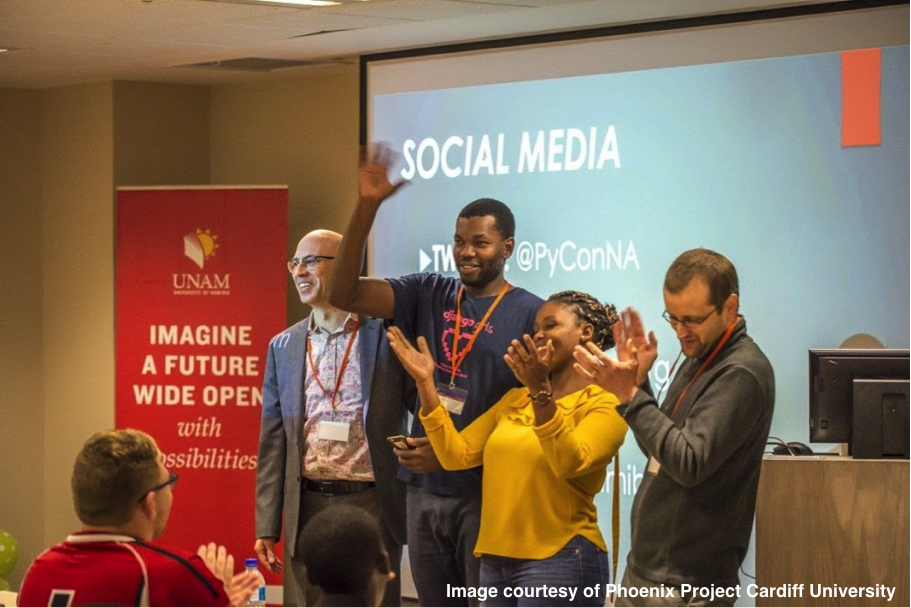PyCon Namibia 2017
Posted on 18 April 2017
PyCon Namibia 2017
 By Nikoleta Glynatsi, Cardiff University.
By Nikoleta Glynatsi, Cardiff University.
I recently became a Sustainable Software Institute Fellow as part of the 2017 cohort. During the selection day, I presented my plans and ambitions that I have set for my fellowship year. My list of plans included attending and running a workshop at PyCon Namibia 2017. PyCon Namibia 2017 is the third PyCon within the country and the organising committee include Jessica Upani, Gabriel Nhinda, Daniele Procida and Vincent Knight. My main reason for attending was to assist and observe what I believe to be a developing Python and research community with a great future ahead.
As part of Cardiff University I was quickly introduced to the Phoenix Project and its plans for fighting poverty and promoting health by working together with the University of Namibia to educate people to help themselves to ensure sustainable change. I was quickly fascinated by the work done by this partnership between the Universities and I was motivated to become involved after Jessica Upani’s talk at PyCon UK 2016.
Long story short, after receiving major help from both the Software Sustainability Institute and the Phoenix Project, I was able to travel all the way to Africa and found myself in the beautiful country of Namibia. It was a three days conference which included:
-
Over 90 attendees
-
A DjangoGirls Windhoek workshop
-
Four workshops across one day
-
20 talks across two days
-
Attendees from Germany, Netherlands, Wales, England, Northern Ireland, Greece, Zimbabwe, South Africa and of course Namibia
The program of the conference can be found here.
Day 1. The conference started of with a welcoming talk from the two main organisers chair of PyNam (the Python Namibia society) Jessica Upani and University of Namibia lecturer Gabriel Nhinda. Jessica’s talk was followed with a welcome from a number of students from PyNam scholars, a programming group for teenage school children Jessica has started at the school she teaches at. Once the welcome ceremony was over, I headed to the Django Girls workshop where along with seven other wonderful coaches guided by Helen Sherwood we ran a very successful workshop with over 25 attendees. I was excused from Django Girls to run a two-hour workshop on Game Theory with Python (notes can be found here) assisted by Vincent Knight. I introduced some basic Game Theory: the example of the Iterated Prisoner’s Dilemma and how we manage to study it using the Axelord Python library. We had eight attendees and throughout the conference we got to see that a number of them showed a real interest in Game Theory, and we managed to have various great conversations about our research field and its applications.
Days 2 & 3, were the days of the talks. This included 20 talks by 16 different speakers followed by a series of lightning talks on both days. The talks varied from personal stories to basic Python to more technical knowledge and inspiring talks from members of the Python community.
Inspiring talks included those given by a team of Zimbabweans that attended the conference. Anna Makarudze and Humphrey Butau talked about their journey to building a Python community and organising PyCon Zimbabwe. Anna talked about the determination of the Zimbabweans and how they worked for and with their local communities. She welcomed and challenged the Namibians to do the same. Ronald Maravanyika, another Zimbabwean, spoke about fighting the low percentages of females in programming and the high percentages of teen marriage in Zimbabwe by introducing girls to computing. That’s how he has now created Zimbopy, "an organic, on-the-ground effort by local Python developers in the Harare [...] to advance the cause of women in tech in Zimbabwe".
Some technical talks included Raspberry Pi and Internet of things (IoT) by Maik Hoepfel, Continuous Integration by Loek van Gent and a whirlwind tour of test setup and A Python Developer's adventures in geographic information system (GIS) by Iwan Vosloo. Daniele Procida gave a very useful talk on how to write software documentation and made a few developers question their projects documentation pages.
A fellow PhD student from Cardiff University, Geraint Palmer, spoke about the importance of plotting in research and gave a series of useful tips on plotting using the matplotlib library. Also from Cardiff University, Vincent Knight, inspired by the fictional character Dr Sheldon Cooper, gave a talk on "Rock Paper Scissors Lizard Spock” using Python. Myself, as a member of Cardiff University and the Software Sustainability Institute, delivered a talk on each day. My first talk was on accessing open literature review using Python and introduced the Python library I have been working on the past few months called Arcas. My second talk was on writing automated tests for research software.
The conference was finished off by Nashilongo Gervasius’ talk about how Namibia is working to meet a 2030 target to become a "knowledge society”. It was followed by a series of lighting talks, including one by Professor Judith Hall, lead of the Phoenix project.
The aim of my visit has been to promote how software is used by researchers and showing good practice techniques, like testing. The Namibia Python community is eagerly trying to develop. They have managed to run a Software Carpentry in 2016 and they are aiming to hold another one in 2017. Software Carpentry, Data Carpentry and small workshops provide a great opportunity for both the UK and Namibian research community to learn from one another. Researchers across the world working together and sharing their knowledge in science and in good research software practice is how better research software will be achieved globally.

PyCon Namibia was a great opportunity for me as a researcher and developer. I have managed to travel, promote my work and meet people from the Python community. More importantly it has given me the opportunity to share the knowledge I have and learn from the proud people of Namibia. Their Python community is still young, thus if you’re looking for a very technical conference, PyCon Namibia might not be what are you looking for. On the other hand, if you’re eager for travelling, teaching and learning how to build a community I would strongly recommend PyCon Namibia.

